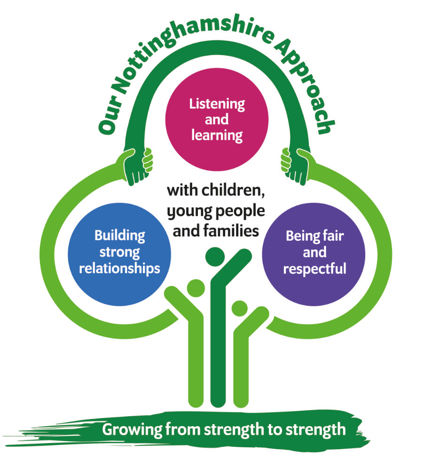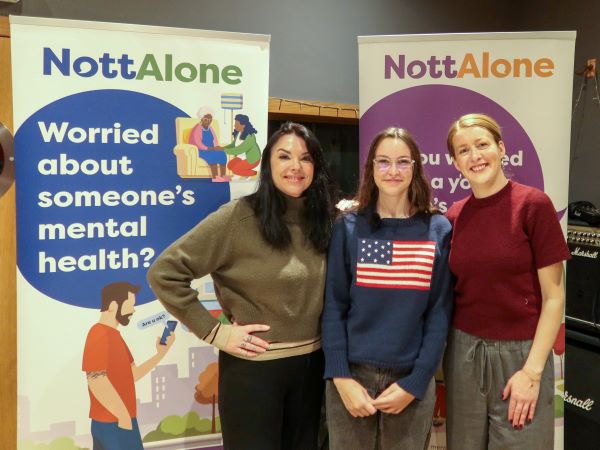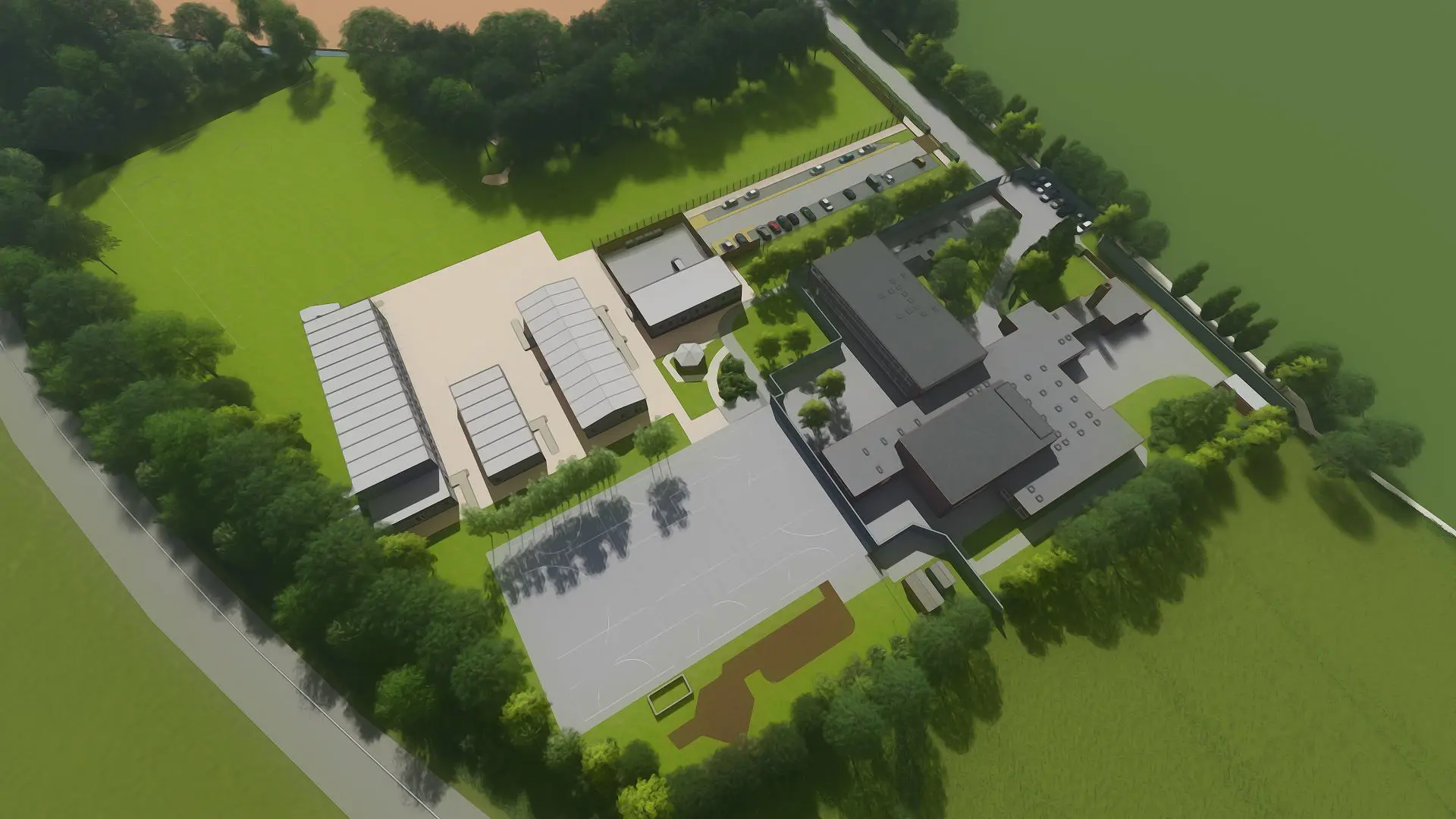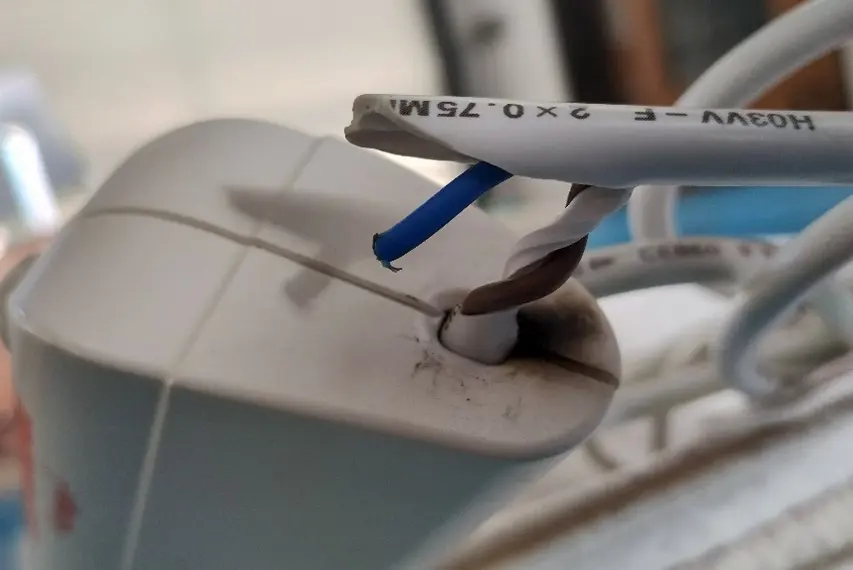Our Strengths-based Approach to Practice
Since October 2019 the Nottinghamshire Children and Families Department has been developing and embedding a strengths-based approach to working with each other, children, young people and families, and our partner agencies. We call this 'Our Nottinghamshire Approach'.
Our Approach aligns with the Nottinghamshire Plan and Nottinghamshire Way. The Nottinghamshire Plan sets out the council's ten year vision. The Nottinghamshire Way is the Council’s approach intended to create and sustain a positive and inclusive culture that reflects all of our values and behaviours.
Watch the two minute animation of Our Nottinghamshire Approach to learn more about how we strive to work in a more strengths-based and trauma-informed way.
- Focusing on people’s strengths, capabilities, motivations, and resources
- Believing all individuals have the capacity to grow, learn and change
- Recognising that people know their own lives and journeys better than anybody else
- Acknowledging that problems are problems, and that they do not define people
- Helping build safe and nurturing relationships and effective support systems
- Listening to the voices of children, young people, parents, carers, and enabling these to influence and shape our services
- Understanding that language and words are important and change the way we perceive ourselves and others
- Being fair and respectful, recognising and supporting equality, diversity, and inclusion
- Holding compassion, empathy, and care towards ourselves, each other, children, and families
- Seeking to understand how systems and the wider world affect people
- Working effectively with partners to provide holistic and multi-agency support
- Having a timely response to risk and harm; promoting safety and stability for children, young people, families, and staff.
Relationship-based practice
Relationship-based practice recognises that everyone has the potential for change, and together people can find solutions that are sustainable. It seeks to develop strong connections, where everyone can understand and trust each other, creating a support system that is understanding and compassionate. Humans are multifaceted, and this requires flexibility and reflectivity in navigating the complex dynamics of relationships with staff, children, young people and families.
Restorative practice
Restorative practice helps to build and maintain positive, healthy relationships, resolve difficulties and repair harm where there has been conflict. It aims to create an ethos of respect, inclusion, cooperation, accountability, and responsibility. Restorative practices enable those who work with children and families to focus on building relationships that create and inspire positive change. Creating change sometimes requires challenge as well as support.
Systemic approaches
Systemic approaches believe that difficulties or challenges, as well as strengths and opportunities, are located within relationships rather than within individuals. They believe that everyone can achieve change, through working together with a whole family or network to do things differently and interrupt patterns that have led to difficulties before.
Fair process
Fair process aims to empower, through authentic and inclusive engagement, inviting contributions from everyone who will be impacted. It addresses exclusion and oppression, promotes transparency around decision-making and expectations, with everyone involved having a shared understanding about why decisions are made.
Social pedagogy
Social pedagogy is a value-based ideology which promotes the importance of having meaningful connections through authentic relationships that enable us to recognise our own and others’ potential, their qualities, strengths, and interests, and to create learning situations in which people can experience their resourcefulness and develop their abilities. Each person deserves to be treated with human dignity and possesses unique inner resources and potential, which others can help to unfold. It aims to holistically support people’s well-being, learning and social inclusion.
Our tree describes Our Nottinghamshire Strengths-Based Approach and values:

We will know we are embedding strengths-based approaches and that these are having a positive, impact, when our shared values are demonstrated, recognised and celebrated in all of the work that we do.
Building strong relationships
We strive to become more trauma-informed in our approach, building and nurturing strong relationships with each other, the children, young people and families we support, and our partner organisations. We seek to develop connections where we can understand and trust each other, creating systems and services that are filled with love, care and compassion.
Listening and learning
Children, young people and their parents and carers understand their own journeys better than anybody else. They have a right to be involved in decisions that affect their lives.
We are committed to working restoratively with children and families so that their voices are listened to and valued, they can influence, and their views are at the heart of our decisions and actions. The views and ideas of all practitioners are also valued and respected creating more holistic, inclusive and diverse systems and services.
Being fair and respectful
Our strengths-based approach and practice is underpinned by our core values of fairness and respect and this is reflected in the language that we use and the way that we treat people with love and kindness.
Children, young people and families, as well as staff and our partners, should experience fair processes through everyone being fully engaged and involved in plans and decisions that affect them. They should also have a shared understanding of why decisions are made, and that everyone being supported is to understand what is expected of them in the future. Our decisions should be balanced, well reasoned, free of discrimination and shame.
We do all of this with children and families at the heart
We hold hope and high aspirations for the children, young people and families we support. We want Nottinghamshire to be the best place for them to live and grow up. We put children and families at the heart of all we do and strive to support them to grow and flourish.
Our Approach also provides a framework in which the six principles of trauma-informed practice can be embedded:
- Safety - I don’t feel threatened
- Trust - People do what they say
- Choice - What are my options?
- Collaboration - We are in this together
- Empowerment - I am taking control of my life
- Cultural consideration - I am being seen and heard
What is trauma?
Trauma results from an event, series of events, or set of circumstances that is experienced by an individual as harmful or life threatening. While unique to the individual, generally the experience of trauma can cause lasting adverse effects, limiting the ability to function and achieve mental, physical, social, emotional or spiritual well-being. Read the GOV.UK definition.
Trauma-aware practice
Trauma-aware practice realises that trauma can affect individuals, groups and communities. This is an approach to health and care interventions which is grounded in the understanding that trauma exposure can impact an individual’s neurological, biological, psychological and social development.
It recognises the signs, symptoms and widespread impact of trauma. It aims to increase practitioners’ awareness of how trauma can negatively impact on individuals and communities, and their ability to feel safe or develop trusting relationships with health and care services and their staff.
It seeks to:
- Improve the accessibility and quality of services by creating culturally sensitive, safe services that people trust and want to use.
- Prepare practitioners to work in collaboration and partnership with people and empower them to make choices about their health and wellbeing.
- Trauma-informed practice acknowledges the need to see beyond an individual’s presenting behaviours and to ask: ‘What does this person need?’ rather than ‘What is wrong with this person?’
The four stages of becoming a trauma-informed organisation
Trauma-Aware: The organisation has a basic understanding of what trauma is, its prevalence and recognises how it can impact on people who use services and staff.
Trauma-Sensitive: The organisation has begun to explore the Trauma-Informed principles in daily work; build consensus, consider the implications of embedding Trauma-informed practice; and is preparing for change.
Trauma-Responsive: The organisation is readily responding to trauma, including support for both the people who use the service and staff, and has begun to change the culture to align with the Trauma-Informed principles.
Trauma-Informed: A Trauma-Informed approach is the norm, accepted and embedding in the organisation so it no longer depends on a few 'ambassadors' or 'leaders'. The organisation continues to work with partners: people with lived experience, communities, external agencies, to strengthen and adapt its Trauma-Informed approach. The services have been rigorously evaluated and outcomes demonstrate the positive impact of changes made.
Further reading and resources
One Minute Guide - Trauma And Strengths Based Practice Key Principles [PDF]
Learn more about techniques to manage the effects of stress and trauma (Practice Development Unit)








